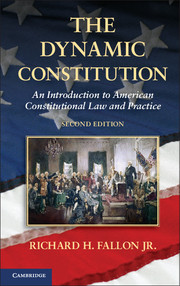Book contents
- Frontmatter
- Contents
- Preface to the Second Edition
- Preface to the First Edition
- Prologue: The Affordable Care Act and Other Vignettes
- Introduction
- Part I Individual Rights under the Constitution
- 1 Freedom of Speech
- 2 Freedom of Religion
- 3 Protection of Economic Liberties
- 4 Fundamental Rights “Enumerated” in the Bill of Rights
- 5 Equal Protection of the Laws
- 6 “Unenumerated” Fundamental Rights
- Part II The Constitutional Separation of Powers
- Part III Further Issues of Constitutional Structure and Individual Rights
- Appendix: The Constitution of the United States
- References
1 - Freedom of Speech
Published online by Cambridge University Press: 05 May 2013
- Frontmatter
- Contents
- Preface to the Second Edition
- Preface to the First Edition
- Prologue: The Affordable Care Act and Other Vignettes
- Introduction
- Part I Individual Rights under the Constitution
- 1 Freedom of Speech
- 2 Freedom of Religion
- 3 Protection of Economic Liberties
- 4 Fundamental Rights “Enumerated” in the Bill of Rights
- 5 Equal Protection of the Laws
- 6 “Unenumerated” Fundamental Rights
- Part II The Constitutional Separation of Powers
- Part III Further Issues of Constitutional Structure and Individual Rights
- Appendix: The Constitution of the United States
- References
Summary
Congress shall make no law…abridging the freedom of speech.
– The Free Speech Clause of the First AmendmentThe most stringent protection of free speech would not protect a man in falsely shouting fire in a theatre and causing a panic.
– Justice Oliver Wendell Holmes Jr.IMAGINE THAT AMID A SPATE OF TERRORIST ATTACKS ON American and European cities, an Al Qaeda sympathizer stands before a sympathetic crowd, exults in the carnage that has occurred already, and urges jihad against the United States. He denounces Westerners, Zionists, and Americans as devils reviled by God. He says that the tide in the battle between the godly and the ungodly has begun to turn and calls for more suicide bombings and other terrorist attacks against infidels, throughout the world but especially in the United States. He urges all lovers of God to launch attacks against nuclear power plants, water supplies, bridges, and synagogues.
If this imagined Al Qaeda supporter did his speech making elsewhere in the world, the United States would likely convey a protest to the appropriate government and demand that it stop him. Speech, we know, often triggers action. We would dislike having a foreign government sit by until an attack actually occurred. Most Western governments, including those with strong commitments to freedom of speech, would make an arrest. But if the speaker were an American citizen, living in the United States, our government would need to adopt a different posture. The imagined speech would be protected by the First Amendment to the Constitution, as interpreted by the Supreme Court of the United States – at least unless the Court could be persuaded to change its mind.
- Type
- Chapter
- Information
- The Dynamic ConstitutionAn Introduction to American Constitutional Law and Practice, pp. 41 - 76Publisher: Cambridge University PressPrint publication year: 2013



